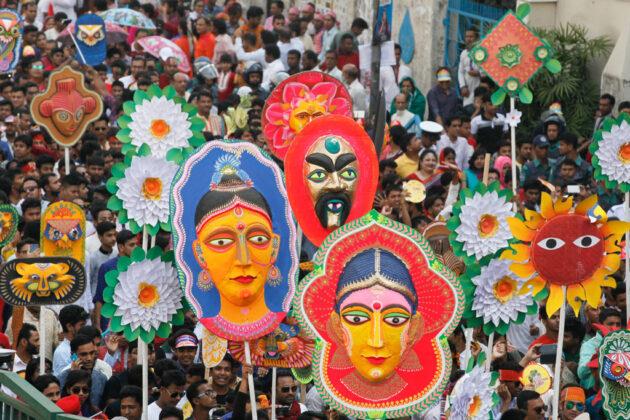The Bengali New Year, also known as Pohela Baisakh or Vaisakhi, is knocking at the door with many colorful celebrations and events. The day is celebrated on 14 or 15 April and is the first day of the Bengali calendar.
It is a public holiday in Bangladesh, West Nepal, Tripura, Assam, and some other foreign countries like the United Kingdom, Singapore, Malaysia, the United States, and Sweden. Etc also seen celebrating the day in full swing.
History
Do you know how the celebration started? You have to go back to 1584 AD to find the origin of the much-talked Pohela Baisakh. Mughal Emperor Akbar in the Indian subcontinent instituted the Bangla calendar in order to obtain the authority to claim rent from the farmers. The number of Bangla years was calculated in 1584 AD, in March. The festival was renamed “Bengali New Year,” it was originally known as “crop year.”
How Does The Celebration begin?
Pohela Baisakh can be celebrated in a variety of ways. This is specially celebrated in Bengali tradition. However, in many foreign countries, the celebration and different events and functions are seen to take place.
On this very day, men wear cloth called Panjabi, and women wear Saree with white and red boards. There were seen “Esho Hey Baisakh” songs all over the place in the main celebrated countries. On Pohela Boishakh, people are seen eating Panta Bhat and Ilish. Panta means cooked rice soaked and fermented in water and Ilish is Hilsha fish. There are different Baisakh Melas (Fair) that take place on this day. The Baisakh fair lasts three or four days.
In foreign countries, people are seen celebrating by creating many events and eating together, and so on. Pohela Baisakh celebrations in different places are organized by immigrants and attract many people from home and abroad. This year Bengali association and people are celebrating the day at different times as the day fell during Ramadan when Muslims around the world do fasting.
Some events are highlighted below so that you won’t miss them. Pushpita Karim writes.
“Canberra Vaisakhi Mela 2022” in Australia
Punjab Aussie Association of South Australia organized the 8th Annual Vaisakhi Mela 2022. It was held on 2 April (Saturday) in Rowe Park, 30 Belalie Road, Ingle Farm, South Australia 5098.
There was a lot of fun, including Bhangra, Gidha, kids performances, different stalls, foods, dance and singing performances, and many more. The event was free for everyone staying in Australia.
“Vaisakhi Mela” in the USA
The Vaisakhi Mela 2022 has been finalized on 21 May at the UofL student center, 1610 West St, Southington, CT 06489-1054, United States. The event was arranged by Gurdwara Guru Nanak Darbar.
Like every year, the Vaisakhi Mela will be celebrated and it is now recognized as one of the most organized Bengali New Year celebrations outside of Bangladesh.
“Swindon Baisakhi Mela” in the United Kingdom
In aid of the Mayor’s Charities, the Swindon Baisakhi Mela will behold at Faringdon Rd Park (GWR Park), SN1 5EH Swindon, the UK on 17 July 2022. The event doors are opened 11 am till 7 pm. The duration of the event is 8 hours. Folk Music, Dance performances, Fashion Show, Henna, Face painting, Clothing, street food, etc will be there for your fun.
The entrance fee for adults is £2. For children, the entry fee is free for up to 10 years. In the event, all sorts of voluntary contributions will be accepted and will donate to the Mayor’s Charities.
Baisakhi Festival in Pune, India
On the occasion of Bengali New Year 1426, Oikyotan Bangiya Parishad, a Bengali Association in Pune, is organizing a 2-day Music Festival at Buntara Bhavana Auditorium in Baner.
This event will include a range of cultural performances by famous artists from Bengal and many Bengali Associations from Pune. An exhibition will also be held of Bengali handicrafts and apparel.
On both days, the Festival will begin at 2 pm. There will be food, shopping, and music. Jayati Chakrabarty, Rabindrasangeet and Adhunik singer, will take the stage on April 6th, followed by highly renowned Bengali elocutionist Bratati Bandyopadhyay.
Expats cherish the culture and pass on the traditions to their children this way. Immigrant children try singing traditional songs, poetry, and dance to traditional music.
Every year, whether at home or abroad, the spirit of Pohela Boishakh is touched by everyone.






